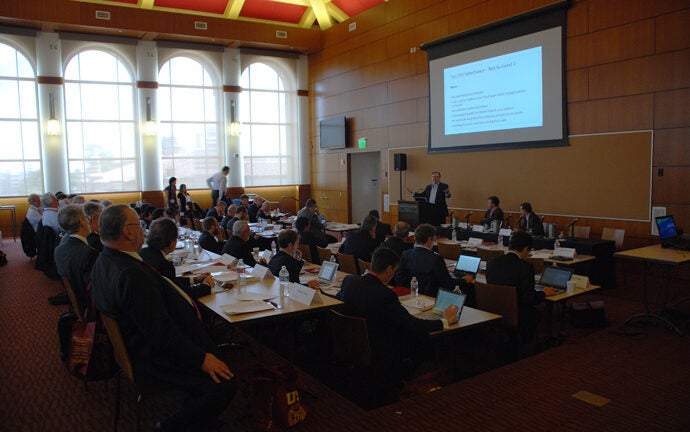
Global economics experts discuss path to progress after European financial crisis
The USC Global Leadership Summit — held April 29-30 at the Ronald Tutor Campus Center on USC’s University Park campus — was a two-day conference featuring leading economic experts discussing the pathway to progress beyond the European financial crisis. Following Greece’s debt emergency, which began in 2010, its effects have reverberated throughout Europe and the world.
Jacob Soll, professor of history and accounting, was the event’s primary organizer.
“The Greek debt issue is now one of the central questions for the stability of the world economy, the very existence of the European Union and stability and democracy in the volatile eastern Mediterranean,” Soll said. “It also raises pressing questions about the Middle East.”
The forum included representatives and major leaders from Greece’s dominant political parties, as well as leaders of Germany and institutions such as the International Monetary Foundation (IMF), the European Central Bank and various leading European organizations.
“This kind of collaboration is very rare,” Soll said. “The fact that USC is so far from Europe fostered a sense of frankness and collegiality among the participants.”
Peter C. Mancall, vice dean for the humanities and social sciences and professor of history and anthropology, agreed.
“This forum embodied the spirit of Linda and Harlan Martens’ generous gift to the USC-Huntington Early Modern Studies Institute (EMSI) to foster in-depth conversations about history and economics that lead to insights relating to global problems,” said Mancall, who holds the Linda and Harlan Martens Directorship of EMSI. “This year Jake [Soll] brought together a dazzling group of leaders and experts. Over the course of the forum, which blended historical investigation with analysis of contemporary problems, the participants made a genuine contribution to crises vexing Europe today.”
Speakers at the conference included:
- Ed Balls, a senior fellow at the Harvard University Kennedy School and British Labor Party member, who gave a talk titled, “Center Left Manifesto for Government Financial Transparency and Accountability.”
- Jörg Asmussen, a former European Central Bank board member and member of the German Ministry of Finance, who delivered a talk titled, “The Role of Government Financial Transparency and Accountability in Western Democracy – A Senior EU Policy Maker’s Perspective.”
- David Walker, senior strategic advisor for PricewaterhouseCoopers and former head of the U.S. Government Accountability Office, who spoke on, “The Vital Role of the Comptroller General of the U.S. Government Accountability Office and the U.S. Government Independent Auditor’s Report.”
- Volker Wieland, a member of the German Council of Economic Experts, who delivered a talk titled, “Maastricht 2.0: Safeguarding the future of the Eurozone.”
- Evangelos Venizelos, former deputy prime minister and minister of finance of Hellenic Republic, who spoke about, “Using International Transparency Standards to Understand the Impact of the 2012 Greece PSI/OSI on the 2015 Debt Burden.”
- Thomas Miller, former U.S. Ambassador to Greece, who gave a talk titled, “Financial Stability: National and Regional Security.”
- William W. Holder, dean of the USC Leventhal School of Accounting, who delivered a talk titled “The Decision Utility and Focus of Governmental Financial Reporting.”
- And Jacob Soll, who discussed “Greek Debt and Financial Accountability.”
“All parties agreed that not only is more fiscal transparency needed on all sides, but also that establishing accounting standards is a way forward to discuss, negotiate and resolve the Greek debt crisis,” Soll said.
He added that leaders were confident that there will soon be a positive resolution.
“We’ve heard this before, and while it seems tough, we now see more clearly the path forward,” Soll said.
The event was sponsored by the USC Martens Economic History Forum, the USC Leventhal School of Accounting, USC Huntington-Early Modern Studies Institute and the Charles & Agnes Kazarian Foundation.
View the full conference online here.